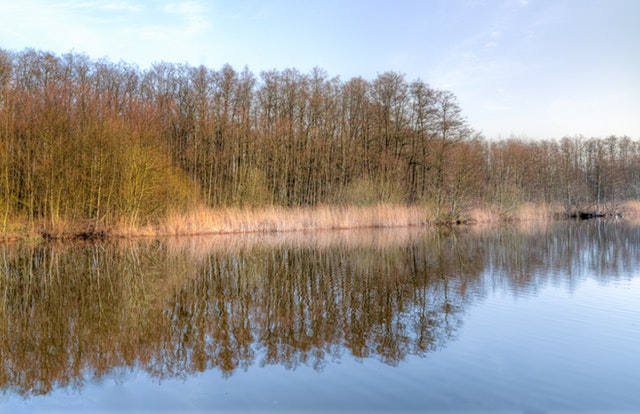French Music – Michel Delpech Posted by Tim Hildreth on Aug 13, 2019 in Culture, Music, Vocabulary
We’ve just had our first few cool nights here in the Northeastern United States and while still weeks away, it got me thinking about a fall state of mind. En France, la fin de l’été et le début de l’automne signale l’ouverture de la chasse (In France, the end of summer and the beginning of fall signals the opening oh hunting season).

I love fall, and there is something charming about the rituals of hunting. Mind you, I’m not really a fan of hunting. I think that’s why the following song from the great French singer Michel Delpech spoke to me.
| Il était cinq heures du matin | It was five o’clock in the morning |
| On avançait dans les marais* | We advanced through the swamps |
| Couverts de brume | Covered in fog |
| J’avais mon fusil dans les mains | I had my rifle in my hands |
| Un passereau prenait au loin | In the distance a sparrow |
| De l’altitude | Gained altitude (rose into the air) |
| Les chiens pressés marchaient devant | The anxious dogs walked in front |
| Dans les roseaux | Through the reeds |
| Par dessus l’étang* | Above the marsh |
| Soudain j’ai vu | Suddenly I saw |
| Passer les oies sauvages | Wild geese go by |
| Elles s’en allaient | They were leaving |
| Vers le midi** | Towards the south |
| La Méditerranée | The Mediterranean |
| Un vol de perdreaux | A flight of pheasants |
| Par-dessus les champs | Above the fields |
| Montait dans les nuages | Climbed into the clouds |
| La forêt chantait | The forest sang |
| Le soleil brillait | The sun was shining |
| Au bout des marécages* | At the end of the wetlands |
| Avec mon fusil dans les mains | With my rifle in the hand |
| Au fond de moi je me sentais | Deep inside me I felt |
| Un peu coupable | A little guilty |
| Alors je suis parti tout seul | So I went off by myself |
| J’ai emmené mon épagneul | I took my spaniel |
| En promenade | For a walk |
| Je regardais | I looked at |
| Le bleu du ciel | The blue of the sky |
| Et j’étais bien*** | And I was good / happy |
| Par dessus l’étang | Above the marsh |
| Soudain j’ai vu | Suddenly I saw |
| Passer les oies sauvages | Wild geese go by |
| Elles s’en allaient | They were leaving |
| Vers le midi | Towards the south |
| La Méditerranée | The Mediterranean |
| Un vol de perdreaux | A flight of pheasants |
| Par-dessus les champs | Above the fields |
| Montait dans les nuages | Climbed into the clouds |
| La forêt chantait | The forest sang |
| Le soleil brillait | The sun was shining |
| Au bout des marécages | At the end of the wetlands |
| Et tous ces oiseaux | And all these birds |
| Qui étaient si bien*** | Who were so good |
| Là-haut dans les nuages | Up there in the clouds |
| Moi, j’aurais bien aimé les accompagner | Me, I would like to have accompanied them |
| Au bout de leur voyage | To the end of their journey |
| Oui, tous ces oiseaux | Yes, all those birds |
| Qui étaient si bien | Who were so good |
| Là-haut dans les nuages | Up there in the clouds |
| J’aurais bien aimé les accompagner | I would like to have joined them |
| Au bout de leur voyage | To the end of their journey. |
* The words marais, étang, and marécages all describe some form of wetlands environment. They can be translated in English as swamp, marsh, or bog. If you’re interested in exploring these environments (and other milieux humides), click here.
** Why is the south of France referred to as “le midi“? Well, selon (according to) this clip from Europe1, we call the south of France (at least the 1/4 of the country below the 45th parallel) le midi because “à midi (en Latin le milieu de la journée) lorsqu’on regarde le soleil, il nous indique le sud)” / at noon, (midi in Latin signifies the middle of the day) when you look at the sun, it points to the south.
*** Notice the use of the verb être here. Remember that bien can be both an adverb (modifying a verb) and adjective (modifying a verb). When used with the verb aller as in Je vais bien it relates to an emotional state of being and describes one’s mood. When used with the verb être though it has a slightly different meaning. For example in Il est bien là ou il est (He/it is good where he/it is) or Les filles étaient bien au chaud devant le feu (The girls where good in in the heat from the fire) it relates more to a physical well-being.

Build vocabulary, practice pronunciation, and more with Transparent Language Online. Available anytime, anywhere, on any device.



